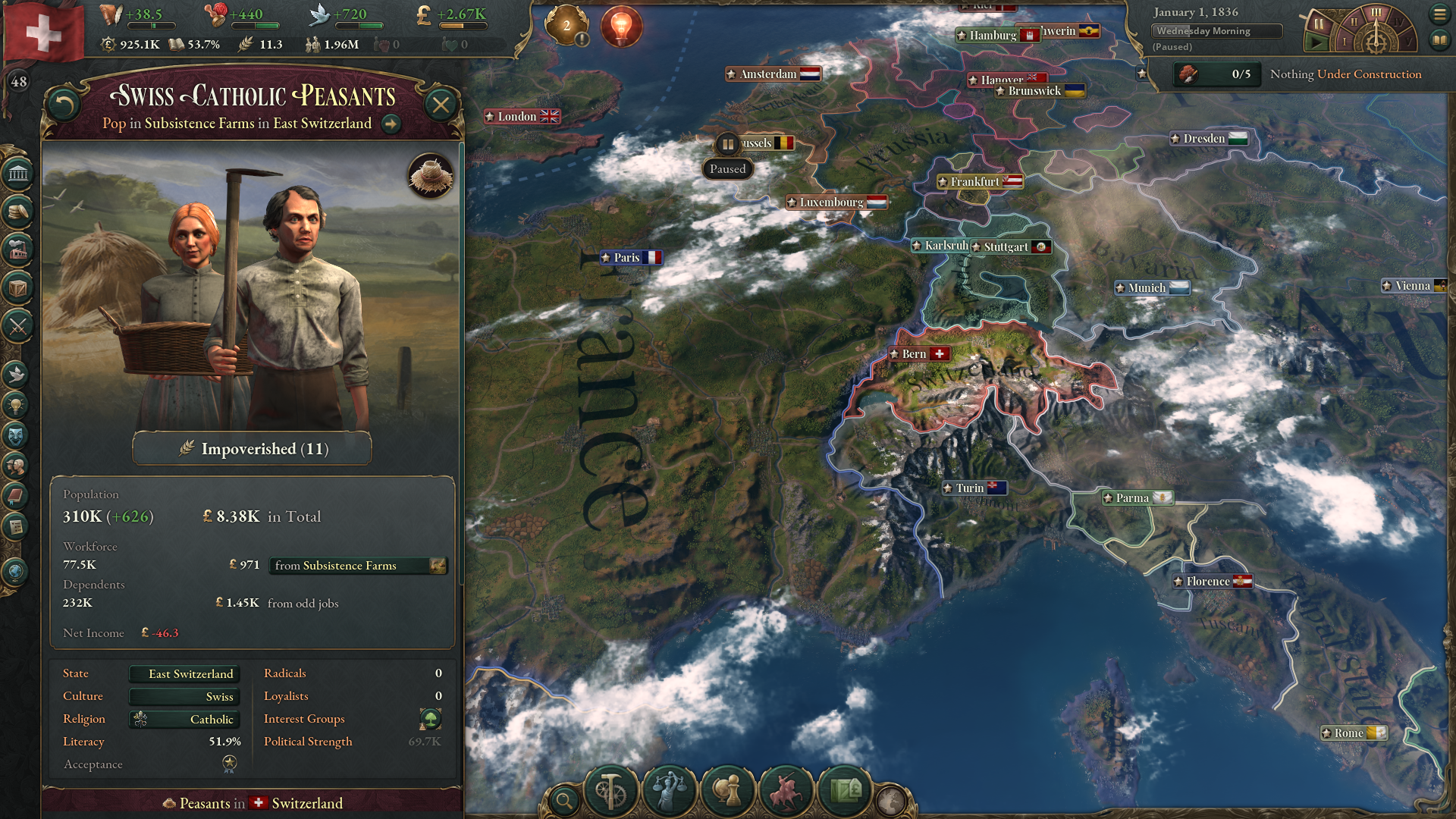Victoria 3 designer on why communism is OP: 'We just implemented the mechanics the way we understood them'
Some players of the grand strategy game are discovering a lot to like about turn-of-the-century communism.

In the month since the release of Paradox Interactive's latest grand strategy game, Victoria 3, some players have struggled with one persistent issue: The communists are right. As entrenched conservative interests in their 19th-century nations prevent modernizing reforms—you know, like abolishing slavery—players start to rail against landowners, exploitative capitalists, and the Petit Bourgeoisie in rants that could have come from Marxists a century ago or today.
"I hate landowners," wrote one player just after release. "I hate these inbred, backass backwards, slave owning, tax stealing, progress blocking, head in the sand, law hating, stupid hat wearing, anachronistic assholes, I hate Landowners."
It's exactly what Mao Zedong himself might've said, except for the swearing, probably. (I am not a historian.) Those rants are happening because in Victoria 3, powerful interest groups can block laws from being passed, and powerful landowners and industrialists will block reforms that could lead to their power, control, and profit being decreased. They love regressive taxation schemes, for example, and ideas like only allowing wealthy people to vote.
Players are also finding that a properly implemented communist economy can lead them to become not just a dominant world power, but one in which the average standard of living for the lower and middle classes is as high, or higher, than that of the upper strata in other nations.
Chances are good some of these effects could be balanced a bit better, which is something we will work on going forward, but the core dynamics won't change...
Mikael Andersson
I said in PC Gamer's Victoria 3 review that the internal politics and economics of Victoria 3 are well-designed systems full of struggles to shape and reform your society's makeup to get the nation you want. To understand why those struggles are leading so many players to the conclusion that communism is OP, I reached out to the Victoria 3 development team, and game designer Mikael Andersson laid it out for me.
"It's no secret that Victoria 3 is in many ways the Historical Materialism Simulator. The way you choose to shape and organize your economy influences the conditions of the individuals participating in that economy," said Andersson. "They in turn shape the political thought in that country and influence it to develop in certain directions. If you emphasize the profits of your capitalist class by importing cheap raw resources from foreign colonies, your private investments will be strong, letting you balloon your manufacturing industry. This also empowers the industrialists who want the country's laws configured in a liberal way to assure those profits and their position in society. But if you focus your economy around domestic manufacture and exports of staple consumer goods in highly productive, technologically advanced factories, your lower classes will thrive, become empowered, and assert their rights to democracy, living wages, and humanitarian policies."
In short, a powerful working class under a worker-owned model producing, consuming, and exporting staple goods raises the prices of, and therefore wages of, everyone involved in key industries like food and construction. Coupled with certain liberal reforms, which both capitalists and communists in the game support, society is not just more stable but economically stronger. Which leads to incredibly funny posts like "Current Communist meta is overpowered" and "Damn this game made me value subsidies and welfare irl."
Keep up to date with the most important stories and the best deals, as picked by the PC Gamer team.
The late-game Council Republic government, an arrangement of workers electing representatives to ever-higher councils, forces working-class ownership of factories and farms. It means distributing wealth more equally, and on more immediate and practical concerns. Andersson explains: "This means no more private investments, but the increased population wealth means more demand is placed on the manufactured goods you're also producing, and less on the exotic luxuries and fine art the mega-wealthy used to spend their excess cash on. This in turn means more stability for your industries, reduced needs for welfare payments, greater tax revenues, and so on."
One other thing to keep in mind is that while Victoria 3 is an ambitious simulation, it is not a complete simulation.
Mikael Andersson
At the same time, it's not like successful communism is incredibly easy to implement. For every post about the communist Council Republic as the S-Tier government, there's another about how minimum wages and welfare shattered a nation's balance sheet, or how a Monarchist, Colonialist Police State can maximize the economic power of a home country at the cost of impoverished colonial subjects. A certain size of economy is needed to pull it off communism well in Victoria 3 and alternatives do work (insomuch as a racist police state can be said to "work"), but a lot of the biggest GDP numbers being posted by Victoria 3's end date of 1936 are using communism to do it.
There are also alternatives to more liberal communism, like command economies and authoritarian, state-run socialism, but players aren't using them as much—nor are they complaining about them.
"We did not plan for these effects to work out in this way," said Andersson, "rather, we just implemented the mechanics the way we understood them, and this is the result. Chances are good some of these effects could be balanced a bit better, which is something we will work on going forward, but the core dynamics won't change: instituting a distribution of wealth that encourages a demand-driven economy is one perfectly valid way of playing Victoria 3.
"One other thing to keep in mind is that while Victoria 3 is an ambitious simulation, it is not a complete simulation. There are currently no distinct mechanics modeling corruption or cronyism, foreign economic influence beyond trade, or direct interference in another nation's politics, all of which could help make 19th century communism seem a bit less appealing than it does in the current meta. Perhaps that's something we will see more of in the future."
Either way, we'll be following Victoria 3 players' rising class consciousness with great interest. Why? Because, at least according to Marx, communism is inevitable.
Jon Bolding is a games writer and critic with an extensive background in strategy games. When he's not on his PC, he can be found playing every tabletop game under the sun.


